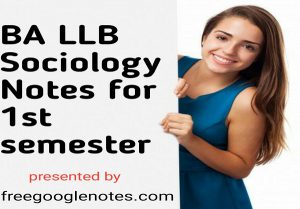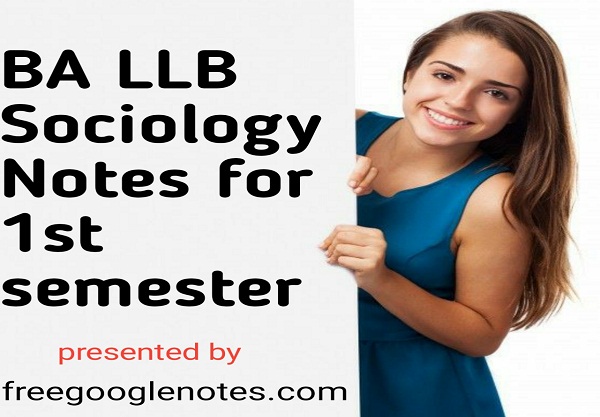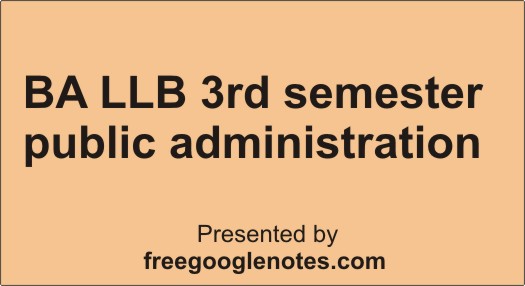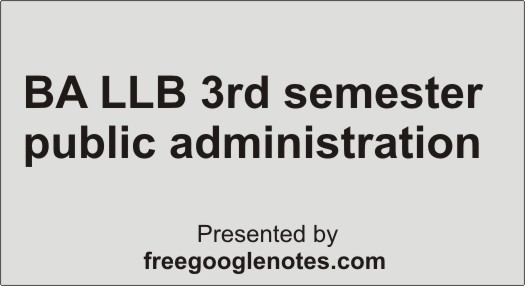Table of Contents
Ba llb Sociology notes for 1st semester
Hello students,
In this post you will learn on the topic Means of Social Control
we explained some useful topic here so , read and learn more on this topic .
Ba llb Sociology notes
Discuss various means of social control.
Ans. Means of Social Control
It would have become evident from the foregoing description of the various types of social control, that there are many direct and indirect, formal and informal means of social control. Among the important means of social control, Ross has enumerated family, educational system, belief and religion, social suggestion, social ideal, ritual and festival, art, leadership, law and administration besides physical force. Giddings have accepted the importance of belief, social direction or guidance religion, social ideals, social festivals, art, leadership, intellectual factors, education and propaganda, law, administration and force, as means of social control.
- Custom. In controlling the behaviour of an individual in society, customs play an important role. They regulate the life of an individual in a way so that he experience the minimum of pressure. Generally, the people themselves want to live according to the custom as such a course firstly saves them from the objections and ridicule of the society and secondly they do not have to resort to original thinking on every aspect. By means of customs they are provided with a clear guidance of every activity. To take an example, among the Hindus there are various definite customs relating to their day to day activity, education, behavioural concepts, procedures, marriage, etc. In the Varnashram system these system have been organised and systematised even further. Hence, a Hindu does not have to think about these things and his life progresses comfortably and in orderly fashion according to the customs instituted after the experience of ages. It has correctly been said by Ginsberg that the role played by customs in life is comparable to the role of instincts in living beings. Instincts guide the living being in his struggle for existence. Customs enlighten man in his social life. From his very childhood man forms the habit of obeying them and he follows them without raising any hue or cry. He comes into possession of these customs when they come down to him in the form of his social heritage or inheritance, and it is these very customs which he bequeaths to his successors. Ordinarily, an individual does not dare oppose the customs. bometimes harmful customs continue to prevail for long periods because cost people do not consider them harmful, while those who du consider
n harmful lack the courage to oppose them. It is an exceptional
individual who transforms customs, withstanding criticism and sometimes even endangering his life but as time passes the people become reconciled to the noval idea and in this way the customs undergo a change. But they do not suffer a loss in their effect of controlling behaviour due to this possibility of their being changed.
- Public Opinion. Public opinion is of main importance as a means of controlling the behaviour of an individual. History bears evidence to numerous incidents of great men having to make great sacrifices because of public opinion. It was on the word of a washerman of his kingdom that the great king Ram Chandra turned his wife Sita out of his house and sent her into exile. In ancient times, many kings resorted to disguise in order to gauge and judge public opinion concerning them. In the present democratic age, public opinion is supremely powerful. In controls the government. Even the most powerful government have to resign if they oppose it. This public opinion is formed by propaganda, news paper, cinema, radio, etc. Before embarking upon improvement of society the wise reformers first create public opinion favourable to them. An individual is more concerned with the reaction of people than even with the wrath of god. It is the fear of disgrace in society which causes most people to keep a check upon their behaviour. It is ordinarily very difficult to contradict public opinion. Some enterprising people do succeed in converting the opinion of the public towards themselves but without doing so they cannot remain in conflict with it for long. Public opinion controls the conduct, behaviour, way of living and methods, etc. of the individual to a fairly large extent.
- Family. Family has great importance as an instrument of social control. The first place where an individual is socialized is the family. It is in the family that he learns the various methods of living, behaviour, conversation, etc. In the family he learns obedience and respect for the opinion of others. The control of parents upon the child is the control of society upon the individual. The family is a basic or fundamental form of society. It has some laws which every member has to obey. As a general rule obedience of these rules is enforced lovingly and effort is made to make the individual understand them but sometimes recourse is had to punishment. In the family, child is taught to behave in a way which conforms to the standard of goodness of the people. A divergence from such behaviour is checked by advising the child of the bad opinion of him which may be formed by other people. In this way, the individual
- learns to respect public opinion and to be controlled by it. The family ingrains into the child the propriety of behaviour in all trades of life. This brings him under the control of mores and traditions. Infringement of the rules of the family brings punishment in its wake and in this way he learns to accept the pressure of law. The family initiates him into the good and the bad. In this way the communal ideals, values and thoughts exercise their influence and control upon him. In the family the child finds the patterns for behaviour by imitating the behaviour of the members of the family. In this way the family educates the individual to accept and obey social control, accustoms him to it and introduces him to the customs. Due to the family the various forms of social control become a part of the individual’s life an he does not experience any difficulty in adjusting to or living under social control in future. This control of the family over the individuals is not restricted within the family but is exercised even outside its precincts. Consideration for the family honour steers an individual clear of many undesirable activities. He has at all times, and in all circumstances, to keep in mind the honour and respect of the family. In this way, the family has control over an individual not merely in his childhood but from his infancy to his senility. In this way, the family is one of the most important agencies or instruments of social control.
- Education. According to Ruskin, “Education consists in making people polite what obey ought to be.” The ideals and patterns of politeness differ from society to society. An individual is trained in these through education. Here the word “education does not connote merely literacy but is employed in its most comprehensive sense. It is only in this meaning of the word that the sociologist studies or contemplates it. Education teaches man the use of the various capacities, abilities, intelligence, etc. bestowed upon him by nature. Education gives him ability to succeed in his struggle for existence. Education is an art of adaptation. For man adaptation is more social than natural. Hence, education adapts man to society. In this way education is an important means of social control.

Ba Llb Sociology Notes For 1st Semester
Education is in the family, school, playground, club, office, in 1, everywhere. At every place the individual is taught something and ollzed. In the family, in school, on the playground, the child learns use of polite behaviour, learns to respect the opinion and advice
Ts and learns to comply with the traditions and mores. Theoretical
learns to respect public opinion and to be controlled by it. The family ingrains into the child the propriety of behaviour in all trades of life. This brings him under the control of mores and traditions. Infringement of the rules of the family brings punishment in its wake and in this way he learns to accept the pressure of law. The family initiates him into the good and the bad. In this way the communal ideals, values and thoughts exercise their influence and control upon him. In the family the child finds the patterns for behaviour by imitating the behaviour of the members of the family. In this way the family educates the individual to accept and obey social control, accustoms him to it and introduces him to the customs. Due to the family the various forms of social control become a part of the individual’s life an he does not experience any difficulty in adjusting to or living under social control in future. This control of the family over the individuals is not restricted within the family but is exercised even outside its precincts. Consideration for the family honour steers an individual clear of many undesirable activities. He has at all times, and in all circumstances, to keep in mind the honour and respect of the family. In this way, the family has control over an individual not merely in his childhood but from his infancy to his senility. In this way, the family is one of the most important agencies or instruments of social control.
- Education. According to Ruskin, “Education consists in making people polite what obey ought to be.” The ideals and patterns of politeness differ from society to society. An individual is trained in these through education. Here the word “education does not connote merely literacy but is employed in its most comprehensive sense. It is only in this meaning of the word that the sociologist studies or contemplates it. Education teaches man the use of the various capacities, abilities, intelligence, etc. bestowed upon him by nature. Education gives him ability to succeed in his struggle for existence. Education is an art of adaptation. For man adaptation is more social than natural. Hence, education adapts man to society. In this way education is an important means of social control.
Education is in the family, school, playground, club, office, in 1, everywhere. At every place the individual is taught something and ollzed. In the family, in school, on the playground, the child learns use of polite behaviour, learns to respect the opinion and advice
Ts and learns to comply with the traditions and mores. Theoretical
- Education. According to Ruskin, “Education consists in making people polite what obey ought to be.” The ideals and patterns of politeness differ from society to society. An individual is trained in these through education. Here the word “education does not connote merely literacy but is employed in its most comprehensive sense. It is only in this meaning of the word that the sociologist studies or contemplates it. Education teaches man the use of the various capacities, abilities, intelligence, etc. bestowed upon him by nature. Education gives him ability to succeed in his struggle for existence. Education is an art of adaptation. For man adaptation is more social than natural. Hence, education adapts man to society. In this way education is an important means of social control.
- education, viz., reading and writing, serves to form the intellectual all this and with practical education he learns to put this practice. The organisation or system of society is disrupted and throw into confusion when the educational systems contradict or when th activity of education does not function correctly, the social control fail to function. Hence education is a necessary condition for the pron exercise of social control. In the absence of an appropriate and organised education social control remains merely an arbitrary pressure which cannot continue for long. Without proper education the harmony of the individual and society is not merely difficult but well nigh impossible Education makes social control normal. It makes social education self-control and the individual does not experience its burden. It is another thing that an educated person cannot easily be persuaded to acquiesce to a wrong or correct form of social control.
- Law. Law is a prominent means of social control. The state enacts laws to control the behaviour of the individual in the society. Disobedience of these laws and their infringement is punished by the government. In this way the control of law is the control of administrative power which is vested in the government officials. Laws are enforced with the help of the court, the police and sometimes the armed forces.
According to Ross, “Law is the most specialized and highly furnished engine of social control employed by society.” Ross has enumerated two functions of law; (1) to crush completely some of the homicidal activities of individual, and (2) to persuade the individual to both pay attention to the rights of others and to act cooperatively. In this way law does not merely protect society or ensure its existence but also contributes to its welfare. The modern state is the welfare state. Hence, in modern states, law enters into all the aspects of life. Law, on the one hand, limits the field of activity of criminal while on the other it prevents other people from criminal activity by threatening punishment. While it protects the obedient from the disobedience of law it also prevents everyone from becoming an obstacle in the path of another. In this way law controls the conduct of the people of the state and grants everyore the opportunity to progress.
- Communal Codes. Communal codes include all those laws of the community by means of which the community exercise its control over the individual. Customs, folkways, mores, morals and rituals, etc., are enumerated under it.
(i) Customs. Shakespeare has called customs ‘a tyrant’, Montaigne
‘a violent schoolmistress’, and Bacon ‘the principle magistrate of man’s life’. All these utterings serve to indicate the control potential of custom. Disobedience of custom brings social disgrace. Custom has great utility from the social standpoint. It is a kind of social necessity.
(ii) Folkways. Folkways are laws of behaviour in society, e.g., people greet each other in England by shaking hands and in India by putting the palms together vertically upward. Folkways develop in the society, unaided by the law of trial and error. Activity which violates them is not punishable but other people in the society look upon such behaviour as degenerate and ridicule it. The fear of social ridicule acts as a large measure of control n the conduct of an individual.
(iii) Mores. Mores are those folkways which are considered essential for the welfare of group. Society exhibits greater sternness in its efforts to win compliance of these folkways. The person who violates mures is turned out of the particular class of society to which he belongs, people do not converse with him and even show a disinclination to marry into his family. An example of a more is the prohibition of cow slaughter in Hindu society.
(iv) Morals. Morals are laws concerning concepts of goodness and badness. In civilized societies non-violence, truth, justice, equality, etc., are considered moral and conduct violating them is condemned. Behind moral is the force of the conscience. It is based on the social consciousness of good and bad. These conceptions of good and bad change according to their context. But in every country the current ethical concepts govern the social behaviour of the individuals.
(v) Rituals. Reforms are those forms of socially accepted behaviour which are important in times of festivals and religious celebrations. These rituals are to be followed as a matter of duty. Among the Hindus, there are many rituals to be performed at festivals such as Holi, Diwali,
etc.
coupled with a love and re feels the pressure by the state and society. I social control.
- Religion. The control of religion is very strong in the social Puere. Every religion has determined some laws of behaviour the bedience of which is considered compulsory. At the base of these sous laws is the fear of divine displeasure and the suffering of hell,
with a love and respect for some invisible power. The individual
pressure of this belief even more than the pressure exerted ate and society. In this way, religion is a powerful weapon of
Recreational Group. In the recreational group a person
undergoes specialization and learns the methods of behaviour towards other people. Hayes has written that “By supervised play children learn by experience that the civilized life is far superior for all concerned than savagery.” Games are based upon laws without following which the game cannot be played. In this way games install in man the habit ol remaining in control and obeying law. Games makes a person pliable and teach him to obey the orders of the leader and cooperate with other people. As a result the sense of group responsibility is awakened in the participants.
- Art. Art also controls the behaviour of men. Poetry, folksongs. drawings, sculpture, music etc., have their effect on man’s emotions and sentiment. Art is a pleasure social control. Its influence is universal. Folksongs are important in every society. Music makes human tendencies refined. Community feelings is enhanced by communal singing and dancing
- Social Ideals. The activities of individuals are affected by the social ideals. Social ideals are subject to change, and are relevant in their own context. But in every country most of the people endeavour to mould their lives according to these social ideals. In modern times, the conduct and behaviour of people of democratic countries has been influenced by democratic ideals of liberty, equality and fraternity while the conduct of the communist population has been swayed by communist ideals.
- Leadership. The leaders have also shown the way for the masses to follow. The path followed by great men is the path to be followed by others. In this way leaders in the religious, social, political and other fields have had great influence upon the lives of people. Mahatma Gandhi and Karl Marx influenced the lives of millions of people. And even otherwise, it is the leaders in every society who enforce the social control.
- Fashion. In the present day, fashion has become an important means of social control. In civilized societies the determinant in the field of thought and conduct, dress, belief, opinions, recreation, jewellery, adornment of the house, way of talking, literature, music, art, in brief, all fields of life, is mainly fashion. With the increase in the means of transport and communication the influence of fashion spreads over a greater range. Fashion is constantly changing but the people are ever desirous of changing with it.
Conclusion
In the above post you have learned Means of Social Control.
Hope you liked this post , please comment us your feedback.









